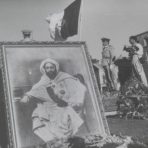History’s Friday Occasions – History of the Mediterranean explored through the case of a transimperial actor : the case of Abd al-Qâdir al-Jazâ’irî (1807-1883)
History’s Friday Occasions – History of the Mediterranean explored through the case of a transimperial actor : the case of Abd al-Qâdir al-Jazâ’irî (1807-1883)
Categories: Lectures and Seminars | Intended for Anyone

433 Paterson Hall
1125 Colonel By Dr, Ottawa, ON
Contact Information
Dominique Marshall, 613-520-2828, history@carleton.ca
Registration
No registration required.
Cost
$0
About this Event
Host Organization: Department of History
More Information: Please click here for additional details.
History of the Mediterranean explored through the case of a transimperial actor : the case of Abd al-Qâdir al-Jazâ’irî (1807-1883) by Sylvain Cornac (Contract Instructor, Department of History)
Abd al-Qâdir al-Jazâirî, "l’émir Abdelkader," is one of the most famous characters of the nineteeth century. He is well-known for the resistance he organized in Algeria against the French invasion, but he is also famous for his actions to save the Christians from violence in Damascus in 1860. His iconic representation in the French colonial and the Algerian nationalist historiographies largely contributed to preventing new perspectives on his life and career. Whereas he was always depicted as the French "Protégé" in Syria or the national hero of independent Algeria after 1962, documents from what was the capital of one of the biggest Mediterranean empires, helped to show Abd al-Qâdir in a position that allowed him to cross borders in many ways. The relationship between him and the Ottomans is much more than a mere confrontation or a simple indifference as we have often read. In fact, the Ottoman state gave him access to a new kind of power in Damascus where he settled in 1855. His vast network throughout the Mediterranean is another aspect of why Abd al-Qâdir is considered a transimperial actor. In that light we can observe him evolving in the political field of the Ottoman Empire and Europe comforted by his various connections but also compelled to define himself through the perspective of his various interlocutors.